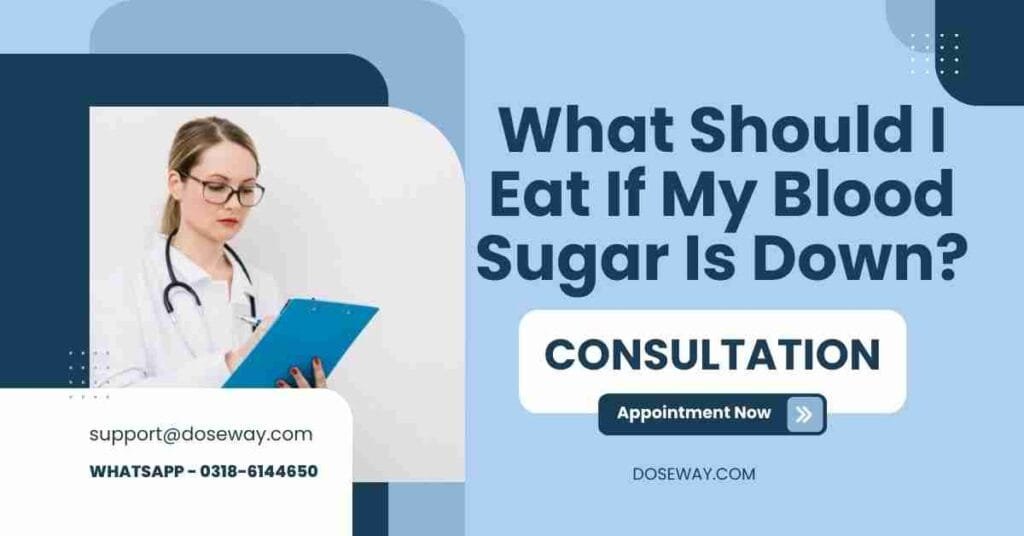If your blood sugar is down—also known as hypoglycemia—you need to act fast. The best way to quickly raise low blood sugar is by eating or drinking 15–20 grams of fast-acting carbohydrates. These are simple sugars your body can absorb quickly. Good examples include ½ cup of fruit juice, glucose tablets, hard candies, or a tablespoon of honey. After 15 minutes, check your blood sugar again. If it’s still low (below 70 mg/dL), repeat the process until you feel better.
Let’s break it down further so you know exactly what to do, what to eat, and how to prevent your sugar from dropping again.
What Should I Eat If My Blood Sugar Is Down?

Table of Contents
Recommended Reading: What Is The One Fruit That Lowers Blood Sugar?
What Is Low Blood Sugar (Hypoglycemia)?
Hypoglycemia happens when your blood sugar levels drop below 70 mg/dL (3.9 mmol/L). It can make you feel shaky, dizzy, weak, confused, or sweaty. If not treated, it can lead to fainting or even seizures in extreme cases.
Common Causes of Low Blood Sugar
Skipping meals
- Taking too much insulin or diabetes medication
- Intense exercise
- Drinking alcohol on an empty stomach
What Should I Eat If My Blood Sugar Is Down?
Here are the best foods to raise blood sugar fast:
Top Quick-Fix Foods (15–20 grams of fast-acting carbs)
- 🍊 Fruit juice: ½ cup (orange, apple, grape)
- 🥤 Regular soda: ½ cup (non-diet)
- 🍬 Hard candies or jellybeans: About 4–6 pieces
- 🍯 Sugar or honey: 1 tablespoon
- 🍇 Raisins or grapes: 2 tablespoons of raisins or 15 grapes
- 🍌 Small piece of fruit: Half a banana
- 💊 Glucose tablets: 3–4 tablets
- 🧴 Glucose gel: 1 single dose (check label)
✅ Tip: Keep these items handy at all times if you’re prone to low blood sugar episodes.
What to Do After Eating Sugar
After consuming a fast-acting carbohydrate:
- Wait 15 minutes.
- Recheck your blood sugar.
- If it’s still below 70 mg/dL, eat another 15 grams of carbs.
- Once stable, eat a balanced snack or meal with carbs + protein (like a sandwich or yogurt with fruit) to prevent another crash.
What to Avoid When Treating Low Blood Sugar
- ❌ Do not eat high-fat foods like chocolate—they slow down sugar absorption.
- ❌ Avoid overcorrecting with too much sugar—it can spike your blood sugar too high.
- ❌ Don’t skip testing—you might think you feel better but still have low levels.
Long-Term Tips to Prevent Blood Sugar Crashes
- Eat regular meals and snacks.
- Avoid skipping meals.
- Monitor your blood sugar frequently if you have diabetes.
- Adjust your medication based on your doctor’s advice.
- Carry emergency sugar sources (like glucose tablets or juice) with you.
When to Call Your Doctor
- If symptoms are severe or don’t go away after treatment.
- If you pass out or have frequent episodes.
- If you are unsure about adjusting insulin or medication.
FAQs: What Should I Eat If My Blood Sugar Is Down?
1. What is the fastest way to raise blood sugar?
Drink fruit juice or eat glucose tablets. These are quickly absorbed and raise your sugar fast.
2. Can I eat chocolate to treat low blood sugar?
No. Chocolate contains fat, which slows sugar absorption. Stick to simple carbs like juice or candy.
3. What happens if I don’t treat low blood sugar?
Untreated hypoglycemia can lead to confusion, unconsciousness, seizures, or even death in extreme cases.
4. Is honey good for low blood sugar?
Yes, honey is a fast-acting carb. One tablespoon can quickly raise your sugar levels.
5. How do I prevent blood sugar from dropping again?
Eat a balanced snack or meal with carbs and protein after treating low sugar to keep it steady.
Final Thoughts
If you’re wondering what should I eat if my blood sugar is down, now you know the answer: fast-acting carbs like fruit juice, glucose tablets, or candies can help quickly. Always follow up with a snack or meal to stay stable. And if you’re diabetic, regular monitoring and keeping emergency carbs on hand are essential. When in doubt, always consult your doctor—especially if low blood sugar becomes a frequent issue.


